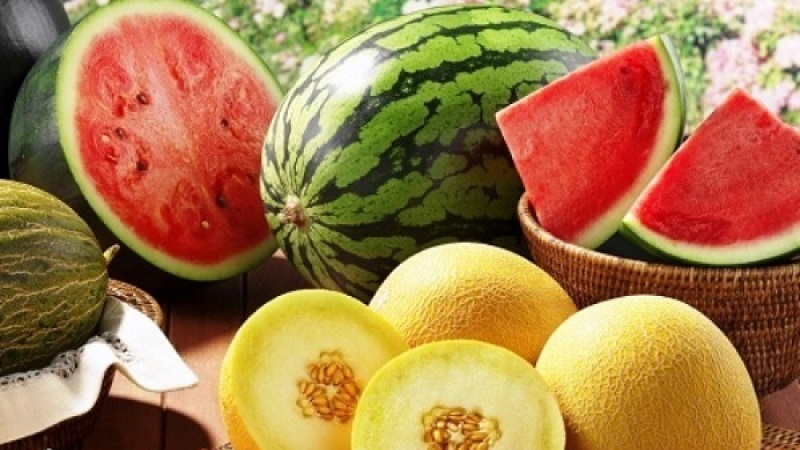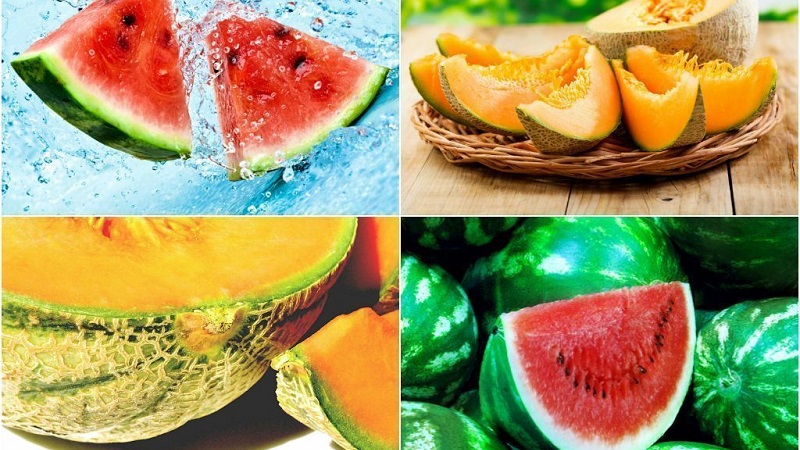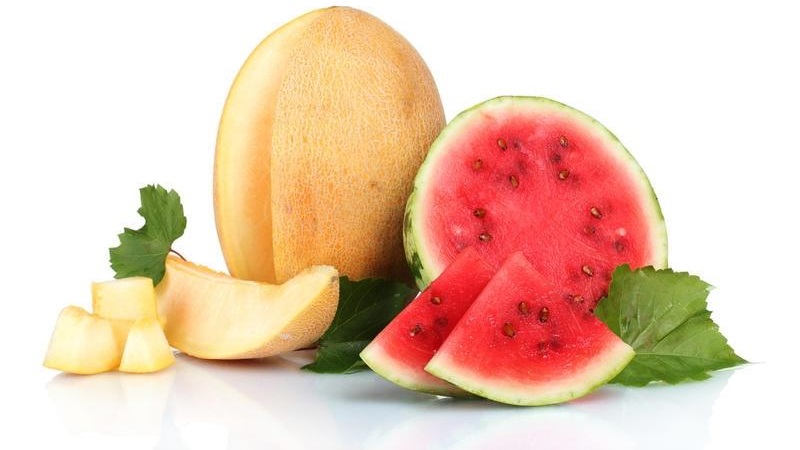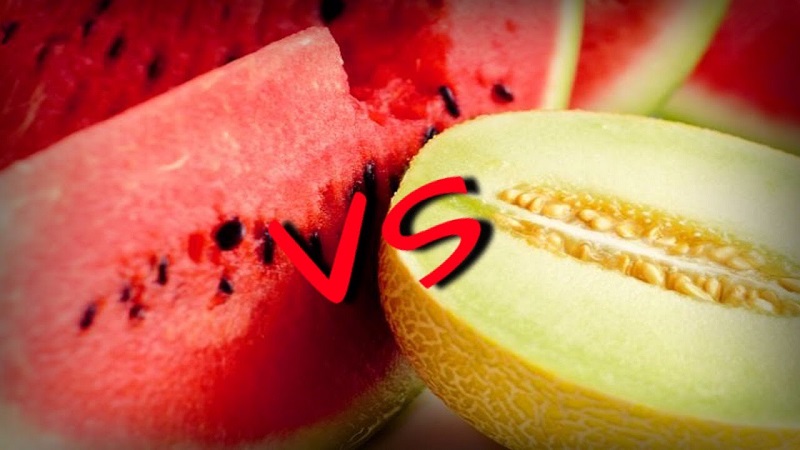What is healthier - watermelon or melon: comparison of compositions and properties
In this article, we'll talk about the most popular summer treats: watermelon and melon... Without a doubt, each of these fruits is delicious and has its own fans. At first glance, it may seem that the watermelon is more watery and has less pulp. However, this is not the case: both melon and watermelon are 90% water. Which of them is healthier, more nutritious and which fruit contains more vitamins and minerals? Let's figure it out.
The content of the article
Watermelon: composition and properties
Watermelon, like melon, belongs to the pumpkin family. Both the pulp and the crusts, which are pre-cooked with sugar, are used for food; they cannot be eaten raw.
Watermelon contains many nutrients. So, in 100 g of pulp:
- vitamin C - 7 mg;
- vitamin PP - 0.3 mg;
- vitamin E - 0.1 mg;
- vitamin A - 17 mcg;
- thiamine (B1) - 0.04 mg;
- riboflavin (B2) - 0.06 mg;
- pyridoxine (B6) - 0.09 mg;
- folic acid (B9) - 8 mcg.
Of the minerals in the composition of watermelon there are:
- potassium - 110 mg;
- calcium - 14 mg;
- magnesium - 12 mg;
- phosphorus - 7 mg;
- sodium - 16 mg;
- molybdenum - 1.8 μg;
- copper - 42 mcg;
- silicon - 12 mg;
- cobalt - 2 μg;
- iron - 1 mg.
Also, in very small quantities, the fruit contains selenium, chromium, fluorine and iodine.
In addition to these nutrients, watermelon contains essential amino acids: valine, arginine, tryptophan, lysine, isoleucine, and phenylalanine. And in the kernels of watermelon seeds there is about 50% fatty oil, which is actively used in cosmetology.

Calorie content and BZHU
In 100 g of watermelon pulp, only 27-35 kcal. Proteins - 0.7 g, fats - 0.1 g, carbohydrates - 5.8 g. In percentage terms, it will look like this: 10.5% / 3.5% / 86%.
Due to the low calorie content of watermelon, it is used for mono-diets and on fasting days, especially since its pulp gives a feeling of satiety for a long time.
Benefit and harm
Due to its rich composition, watermelon is considered a healthy vitamin product. Its effect is as follows:
- Helps break down kidney stones.
- Normalizes blood pressure and strengthens the cardiovascular system as a whole.
- Reduces the risk of heat stroke.
- Lowers blood cholesterol levels, prevents the development of hypertension, heart attack, stroke and atherosclerosis.
- Eases attacks of bronchial asthma.
- Fights age-related changes in vision.
- Increases male libido and improves potency.
- Reduces pain and inflammation in gout.
- Reduces the risk of cancer of the prostate, breast, lung and skin.
- Maintains normal weight.
- Strengthens the immune system.
Excessive consumption can also cause harmful effects such as nausea, diarrhea and gas. This is due to the high dose of lycopene and potassium.
Pregnant women should limit the use of watermelon in order to exclude frequent urination in the last stages.
There are contraindications for which you should completely exclude watermelon from your diet:
- serious impairment of kidney and liver function;
- problems with urine flow;
- kidney stones with a diameter of more than 4 mm;
- diarrhea and persistent colitis;
- type 2 diabetes.
Important! Watermelon tends to accumulate harmful substances - nitrates. This is another factor because of which even healthy people should not abuse it.

Melon: composition and properties
Melon contains many nutrients, just like watermelon. By the content of vitamin C (20 mg), it surpasses all other melons and gourds. In addition to ascorbic acid, melon contains the following vitamins:
- A - 67 mcg;
- B1 - 0.04 mg;
- B2 - 0.04 mg;
- B4 - 7.6 mg;
- B5 - 0.23 mg;
- B6 0.6 mg;
- B9 - 6 mcg;
- PP - 0.5 mg;
- K - 2.9 μg;
- beta-carotene - 0.4 mg.
Melon contains micro- and macroelements:
- potassium - 118 mg;
- calcium - 16 mg;
- magnesium - 13 mg;
- sodium - 32 mg;
- phosphorus - 12 mg;
- chlorine - 50 mg;
- silicon - 82 mg;
- iron - 1 mg;
- iodine - 2 μg;
- cobalt - 2 μg;
- copper - 47 mcg;
- chromium - 2 mcg;
- fluorine - 20 mcg.
100 g of melon pulp contains such an amount of silicon that it covers the body's daily requirement by 270%. Silicon plays an important role in the natural synthesis of collagen.

Calorie content and BZHU
The calorie content of a melon is 30-35 kcal. Proteins in 100 g of pulp - 0.6 g, fats - 0.3 g, carbohydrates - 7.4 g. In percentage terms - 7% / 8% / 85%.
The fruit contains a lot of fiber, which has a positive effect on intestinal peristalsis.
Benefit and harm
Melon contains a large number of substances important for the normal functioning of the body and has beneficial properties:
- Removes slags.
- It has a diuretic effect.
- Improves the condition of skin, hair and nails. Prevents the appearance of wrinkles.
- Normalizes female hormonal levels.
- It removes free radicals from the body, which reduces the risk of developing cancer.
- Strengthens the immune system.
- Reduces the risk of developing cataracts and macular degeneration.
- Strengthens blood vessels.
- Has a calming effect.
- Improves the work of the cardiovascular system.
- It has a positive effect on joint health by preventing arthritis and osteoporosis.
- Has anti-inflammatory effect.
- Helps with irregular bowel movements.
- Normalizes the work of the urinary system.
- Removes worms (one glass of melon juice on an empty stomach).
Melon harm is provoked by its misuse. It can manifest itself by frequent urination, diarrhea or hypervitaminosis.
Which is healthier: watermelon or melon
Both fruits contain an equal amount of water. This can make them appear empty and watery. But, as we have already found out, this is completely wrong.
The nutritional value of watermelon and melon is roughly the same and can vary depending on where and how they grow. If you want to rejuvenate joints and appearance, it is worth leaning on the melon. If you are concerned about high blood pressure and cholesterol in the blood, then watermelon will help you.
These fruits have a positive effect on the urinary system, vision and immunity. They give the body a similar set of vitamins and nutrients.

Terms of use
By adhering to the rules of eating watermelon and melon, you can avoid unpleasant consequences:
- Eat them two hours before or two hours after eating.
- Do not drink them with water or alcohol.
- Do not eat watermelon and melon with milk or dairy products.
- The daily rate of watermelon is no more than 1 kg.
- The daily rate of melon is 500-800 g.
Contraindications for their use:
- individual intolerance, allergies;
- problems with the digestive tract;
- kidney disease.
Since watermelon and melon contain a lot of sugar, people with diabetes need to use them with great care. The standard daily dose should be halved.
Important! Excessive eating melon nursing a woman can cause colic in a child, and watermelon - a change in the quality of milk.
Conclusion
Both melon and watermelon are delicious and healthy. They have a lot in common: both fruits are diuretics, they have a positive effect on vision and heart function. However, there are individual characteristics: melon rejuvenates, and watermelon increases potency and reduces blood pressure.
Each of them contains a large amount of vitamins and minerals, the composition of which is only slightly different.